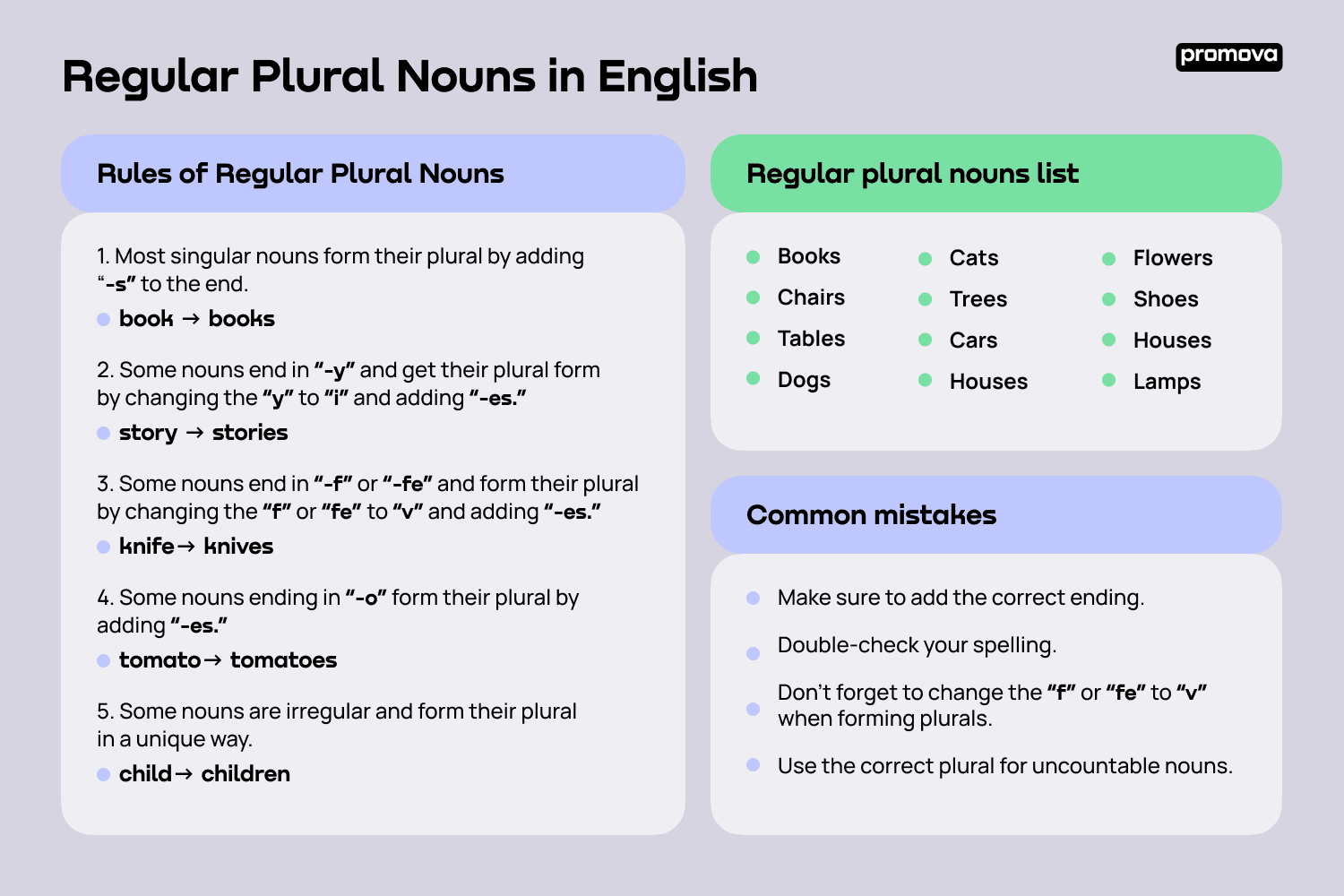Regular Plural Nouns in English
Contents
Regular plural nouns are important to know if you want to speak English fluently. But what exactly are they? How can you recognize them? What are some tips to help you use them correctly? In this reference, we’ll answer these questions and more about regular plural nouns in English.
What is a Regular Plural Noun?
A regular plural noun is simply a noun that has been changed from singular to plural. To create it, you can add -s or -es to the end of the word. For example, the singular noun “book” becomes the plural noun “books.”
Regular plural nouns can be either countable or uncountable. Countable nouns are things can be counted, such as “books,” “chairs,” and “tables.” Uncountable nouns, on the other hand, cannot be counted, such as “love,” “happiness,” and “water.”
Regular plural nouns are common in English and they are used to describe more than one of something. For example, if you see more than one car, you would say “cars.”
Rules of Regular Plural Nouns
Now that you know what regular plural nouns are and how we use them, let’s look at some rules to help you use them correctly.
- Most singular nouns form their plural by adding -s to the end. For example, “book” becomes “books.”
- Some nouns end in “-y” and get their plural form by changing the “y” to “i” and adding -es. For example, “story” becomes “stories.”
- Some nouns end in “-f” or “-fe” and form their plural by changing the “f” or “fe” to “v” and adding -es. For example, “knife” becomes “knives.”
- Some nouns ending in “-o” form their plural by adding -es. For example, “tomato” becomes “tomatoes.”
- Some nouns are irregular and form their plural in a unique way. For example, “child” becomes “children.” You can learn more about them in a separate reference, and as a rule many of them have to just be memorized.

Regular Plural Nouns List
Here is a list of some simple regular plural nouns in English:
- Books
- Chairs
- Tables
- Dogs
- Cats
- Trees
- Cars
- Houses
- Flowers
- Shoes
- Houses
- Lamps
As you can see, all of them are formed by placing -s or -es to the end of the singular noun.
8
Regular Plural Nouns Examples in Sentences
To help you understand how to use regular plural nouns correctly, let’s look at some examples of them in sentences:
- I saw two cats in the garden.
- There were many trees in the park.
- The house had several chairs in the living room.
- I bought some new shoes.
- We need more tables for the library.
Common Mistakes
Now that you know the rules for forming regular plural nouns, let’s look at some common mistakes to avoid.
- Make sure to add the correct ending. For example, the plural of “book” is not “bookes.”
- Double-check your spelling. For example, the plural of “story” is not “storie.”
- Don’t forget to change the “f” or “fe” to “v” when forming plurals. For example, the plural of “knife” is not “knifes.”
- Use the correct plural for uncountable nouns. For example, the plural of “love” is not “loves.”
Lastly, try to be precise in your language. Even if you know how to use plural forms correctly, adding too many without clarity about what you refer to can make a sentence confusing.
Summary
In this reference, we’ve discussed what regular plural nouns are and how to use them correctly. We’ve looked at a list of regular plural nouns, examples of them in sentences, the rules for forming them, and some common mistakes to avoid.
Knowing regular plurals can help you become a better and more confident English speaker. So don’t be afraid to practice more and see how much better you do in your conversations!
Comments